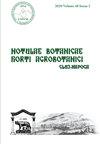生物炭是缓解植物干旱胁迫的一种有前途的改良剂:综述与未来展望
IF 1.4
4区 生物学
Q3 PLANT SCIENCES
引用次数: 0
摘要
干旱胁迫(DS)是最具破坏性的非生物胁迫之一,对植物的生长和产量有负面影响。由于水源枯竭、降雨量减少和全球变暖,干旱胁迫的强度在不断增加。世界人口正以惊人的速度增长,这就需要大幅提高作物产量,以满足全球粮食需求。因此,在这种情况下,我们必须在气候变化迅速和非生物胁迫加剧的情况下提高作物产量。在全球范围内,人们采取了不同的措施来减轻土壤胁迫的不利影响,最近,生物炭(BC)作为一种极佳的土壤改良剂出现,可以减轻土壤胁迫的毒性影响,提高作物产量。生物炭的应用可保持膜的完整性、植物水分关系、养分平衡、光合作用、激素平衡和渗透溶解物的积累以及基因表达,从而提高植物在干旱胁迫下的表现。此外,在干旱缺水条件下施用硼酸还能提高土壤有机质、持水能力、土壤结构稳定性和有益微生物的活性,从而改善干旱缺水条件下的植物表现。本综述讨论了萃取物缓解干旱对植物不利影响的不同机制。本综述就碱性土在减轻土壤干旱不利影响方面的作用提出了新的建议。本文章由计算机程序翻译,如有差异,请以英文原文为准。
Biochar a promising amendment to mitigate the drought stress in plants: review and future prospective
Drought stress (DS) is one of the most destructive abiotic stresses that negatively affects plant growth, and yield. The intensity of DS is continuously increasing due rapid of water sources, less rainfall, and an increase in global warming. The world’s population is increasing at an alarming rate which needs a substantial increase in crop production to meet global food needs. Therefore, in this context, we must have to increase crop production in the scenarios of rapid climate change and increasing intensity of abiotic stresses. Globally, different measures are used to mitigate the adverse impacts of DS, recently biochar (BC) has emerged as an excellent soil amendment to mitigate the toxic effects of DS and improve crop production. The application maintains membrane integrity, plant water relations, nutrient homeostasis, photosynthetic performance, hormonal balance and osmolytes accumulation, and gene expression thereby improving plant performance under DS. Moreover, BC application under DS also improves soil organic matter, water holding capacity, soil structure stability, and activity of beneficial microbes which can improve the plant performance under DS. In the present review different mechanisms through which BC mitigates the adverse impacts of DS on plants are discussed. This review provides new suggestions on the role of BC in mitigating the adverse impacts of DS.
求助全文
通过发布文献求助,成功后即可免费获取论文全文。
去求助
来源期刊

Notulae Botanicae Horti Agrobotanici Cluj-napoca
PLANT SCIENCES-
CiteScore
2.70
自引率
0.00%
发文量
118
审稿时长
3 months
期刊介绍:
Notulae Botanicae Horti Agrobotanici Cluj-Napoca is a peer-reviewed biannual journal aimed at disseminating significant research and original papers, critical reviews and short reviews. The subjects refer on plant biodiversity, genetics and plant breeding, development of new methodologies that can be of interest to a wide audience of plant scientists in all areas of plant biology, agriculture, horticulture and forestry. The journal encourages authors to frame their research questions and discuss their results in terms of the major questions of plant sciences, thereby maximizing the impact and value of their research, and thus in favor of spreading their studies outcome. The papers must be of potential interest to a significant number of scientists and, if specific to a local situation, must be relevant to a wide body of knowledge in life sciences. Articles should make a significant contribution to the advancement of knowledge or toward a better understanding of existing biological and agricultural concepts. An international Editorial Board advises the journal. The total content of the journal may be used for educational, non-profit purposes without regard to copyright. The distribution of the material is encouraged with the condition that the authors and the source (Notulae Botanicae Horti Agrobotanici Cluj-Napoca or JCR abbrev. title Not Bot Horti Agrobo) are mentioned.
 求助内容:
求助内容: 应助结果提醒方式:
应助结果提醒方式:


